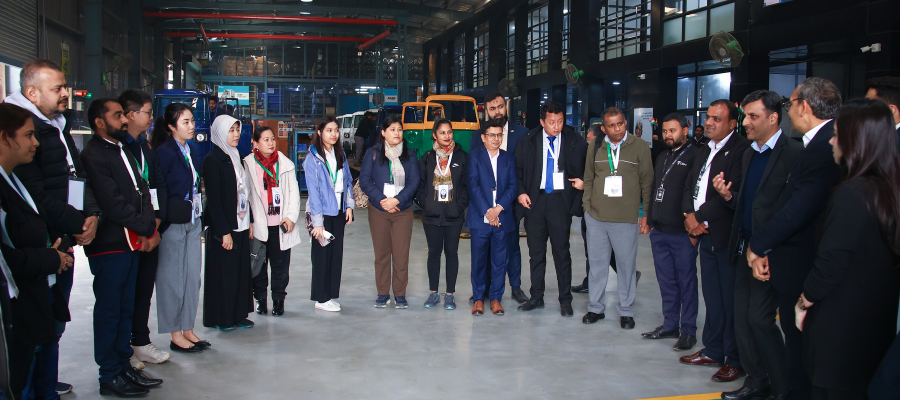
In a significant initiative to foster low-emission and climate-resilient development in Asia, delegates from seven Asian countries participated in a two-day study tour of electric vehicle (EV) manufacturing and battery recycling facilities in the Delhi-National Capital Region (NCR), India, on January 30 and 31, 2024.
The tour meticulously showcased diverse and sophisticated EV technological solutions, demonstrating India's commitment to pioneering sustainable transportation technologies.
Delegates from Bangladesh, Bhutan, Indonesia, Sri Lanka, Philippines, Thailand, and Vietnam participated in this insightful programme, supported by NITI Aayog and organised by the Asia LEDS Partnership (ALP) with Global Climate Action Partnership (GCAP). ICLEI South Asia hosts the ALP Secretariat in Delhi.
The two-day knowledge exchange programme had a comprehensive itinerary packed with visits to cutting-edge facilities in the NCR, which specialise in the crucial areas of EV battery recycling and advanced EV manufacturing. Day 1 of the tour included visits to LOHUM Cleantech Pvt Ltd in Greater Noida city, where the participants took a deep dive into the entire lifecycle of EV batteries — from production to recycling — thereby getting an overview of the comprehensive efforts being made towards adopting circular economy principles. The importance of circularity in the battery system was a key focus, with insights into managing hazards, enhancing battery life, efficiency, and understanding the vital role of recycling and repurposing in the EV ecosystem. This hands-on exposure highlighted the tangible strides being made through international collaboration in propelling the transition towards more sustainable mobility solutions.
At the end of the first day, the delegates had the opportunity to interact with Mr. Sudhendu J. Sinha, Adviser (Infrastructure Connectivity and Electric Mobility) at NITI Aayog, India's leading policy think tank. This was an essential opportunity to gain deeper insights into India's EV landscape, allowing the participants to directly engage with a pivotal figure in shaping India's EV policies.
During this interactive session, the delegates also discussed their national contexts, challenges, and aspirations in the EV sector, and exchanged views on policy frameworks, technological advancements, and strategies for sustainable EV integration in their respective countries. Mr. Sinha, drawing on his extensive experience, offered guidance and highlighted the potential pathways for collaboration and knowledge sharing across borders.
The second day of the study tour commenced with a highly anticipated interaction with Mr. Uday Narang, founder of Omega Seiki Mobility. Held against the backdrop of the burgeoning demand for EVs in Asia, the day offered an exclusive glimpse into the world of EV manufacturing and innovation. Mr. Narang eloquently outlined Omega Seiki Mobility's journey, its commitment to sustainable transportation solutions, the role of innovative technology and the company's efforts in addressing specific needs of the EV market, with a focus on battery technology, vehicle efficiency, and sustainability. He stressed the importance of understanding the diverse requirements of different Asian markets, enumerating how tailored solutions could significantly boost EV adoption and efficiency across the region.
The delegates were then taken on a tour of the Omega Seiki Mobility facility in Faridabad, NCR, for an up-close view of the manufacturing processes, from the assembly line to the final testing stages of EVs. The facility tour was particularly enlightening in terms of understanding the complexities involved in EV production. Delegates saw firsthand how advanced technologies are employed in creating electric two-wheelers, three-wheelers, and freight vehicles. This experience was crucial in understanding the operational challenges and opportunities in the EV manufacturing sector.
On their part, the delegates highlighted the practical and actionable insights, emphasising the role of such collaborations in advancing sustainable transportation, and providing pivotal learnings for shaping EV policies in their countries. For instance, while this tour will help Bangladesh in achieving its goal to increase the EV uptake to 30% by 2030, the country has also asked for further support from the ALP.
The nations that participated in the tour are members of the Leadership Group for Clean Transport in Asia (LG-CTA), a collaborative effort under the ALP to promote clean and sustainable transportation in Asia. This group is instrumental in designing and implementing policies and projects for sustainable transportation. The ALP Secretariat offers tailored capacity-building programmes and technical assistance to address the unique progression needs of various Asian countries, especially in battery recycling, repurposing, and manufacturing.
This study tour stands as a testament to the power of international cooperation in fostering sustainable mobility. Through this immersive experience, the programme emphasised the shared global responsibility and the need for collaborative efforts in addressing the pressing challenges of climate change.